Relearning How to Belong: After Rebellion.
A culture that once fought to be free now fights to feel real. Having banished hierarchy, we discovered anxiety; having dethroned dogma, we enthroned the self. The task ahead is not rebellion but repair—the slow reconstruction of practices that let us live together again.

The winners still talk like dissidents. That is the oddity of our age. The sensibility that dismantled mid-century moral authority—the long Sixties with its suspicion of hierarchy and zeal for authenticity—now occupies the cultural center yet continues to speak as though besieged. As George Owers observed in a recent Compact essay, for many arbiters of taste and policy “it’s an eternal 1950s,” a perpetual last stand against a moral establishment which for most part remains in memory (“The Sixties Are Over,” 2025). His provocation is useful as a lens rather than an endpoint. If a culture learns to confirm its virtue by locating enemies, then victory is not the end of conflict but the beginning of a standing search. That habit—once moral, now reflexive—has somehow become a fuel for polarization.
The results are measurable. Over the last decade, Americans have come to describe the other party not merely as wrong but as worse—more immoral, more dishonest, more closed-minded. In 2016, about half of Republicans and a third of Democrats said the opposing party was “a lot or somewhat more immoral” than other Americans; by 2022, those shares had jumped to roughly seven in ten Republicans and nearly two-thirds of Democrats. Similar surges appear for “dishonest” and “closed-minded.” What we face is not just policy disagreement but moralized estrangement. (Pew Research Center, 2022).
There is of course to rejoice about what the Sixties accomplished: they widened the sphere of personal conscience, broke open closed hierarchies, and liberated voices long kept silent. Yet, like every social movement that begins by expanding freedom, its victory carried the seed of its excess—the dethronement of all authority, even the kinds that sustain belonging and purpose. Where older civic and religious grammars prized restraint, fidelity, and duty, the new ethic prized authenticity, transgression, and sensitivity to harm. The telos of argument shifted: to expose hidden domination was to prove one’s moral seriousness. And a culture taught to confirm its virtue through denunciation does not easily develop the arts of coexistence.
A culture taught to confirm its virtue through denunciation does not easily develop the arts of coexistence.
There is also a political economy to this style. The counterculture did not remain a counter. Thomas Frank chronicled how “hip capitalism” learned to sell rebellion as identity (Frank, The Conquest of Cool, 1997). Others described a managerial ethos that absorbed the artist’s critique—flexible, anti-bureaucratic, allergic to limits—into a new spirit of capitalism (Boltanski & Chiapello, The New Spirit of Capitalism, 2005). Once authenticity becomes a brand and disruption a metric, today’s moral style and market logic rhyme: each thrives by unseating settled forms. The system learned to monetize the act of unmasking - the moral performance of exposing hidden power, signaling virtue through suspicion, and converting outrage into engagement.
Once authenticity becomes a brand and disruption a metric, today’s moral style and market logic rhyme: each thrives by unseating settled forms. The system learned to monetize the act of unmasking - the moral performance of exposing hidden power, signaling virtue through suspicion, and converting outrage into engagement.
The digital attention marketplace has perfected the alliance. Studies of online diffusion show that adding moral-emotional language to a message—outrage signals, sanctimony, contempt—predictably increases its spread. A large empirical analysis found that each additional moral-emotional word could boost retweets by roughly twenty percent on polarizing topics (Brady et al., 2017). Moral outrage in digital spaces, as Molly Crockett argues, has lower costs, higher social rewards, and algorithmic tailwinds. That is not conspiracy; it is design. Platforms have discovered that “sectarian fear or indignation” is an engagement accelerant. (Brady et al., PNAS, 2017; Crockett, Nature Human Behaviour, 2017).
The consequence is a feedback loop: a moral culture that confers status for unveiling hidden oppressors meets an infrastructure that rewards indignation. Enemies become a renewable resource. The more we search for them, the more we find—and the less we remember how to live with people we strongly dislike.
The consequence is a feedback loop: a moral culture that confers status for unveiling hidden oppressors meets an infrastructure that rewards indignation. Enemies become a renewable resource. The more we search for them, the more we find—and the less we remember how to live with people we strongly dislike.
The alliance between moral outrage and digital attention has power because it draws on something older than the internet: our need to belong. What we mistake for ideological fervor is often a displaced search for membership. Our moral psychology, as Jonathan Haidt argues, evolved less to reason in solitude than to bind us into cooperative tribes. “People bind themselves into political teams that share moral narratives,” he writes. “Once they accept a particular narrative, they become blind to alternative moral worlds” (The Righteous Mind, 2012). In earlier eras, that moral energy was tempered by shared frameworks—town halls, churches, civic rites, and common metaphors of the good—that gave belonging a civic form. In Charles Taylor’s phrase, we now inhabit an “immanent frame,” a world in which transcendence is optional and fragile (A Secular Age, 2007). When the sacred recedes from religion, it reappears in politics: we sacralize our causes because we still need liturgies.
The alliance between moral outrage and digital attention has power because it draws on something older than the internet: our need to belong. What we mistake for ideological fervor is often a displaced search for membership.
This migration of moral energy—from community to ideology—was not lost on earlier thinkers. Raymond Aron saw the swap early. When religious belief wanes, he warned, political ideologies rush to fill the void, functioning as “secular religions” that offer narrative, election, and destiny to their adherents (The Opium of the Intellectuals, 1955). What Haidt describes as our evolved hunger for belonging, Aron saw as the sociological engine of new faiths: parties and movements that promised transcendence without transcendence. Eric Voegelin pushed the insight further, describing modern political projects as immanentized Gnostic attempts to manufacture salvation by human will while forbidding radical questioning (The New Science of Politics, 1952). Our present absolutisms—Left and Right alike—repeat the pattern: they cast politics as a sacred drama between the pure and the corrupt, sustain themselves through moral revelation and public penance, and promise a form of collective redemption—whether through justice, purity, or national rebirth. What was once theology now survives as political liturgy.
Our present absolutisms—Left and Right alike—repeat the pattern: they cast politics as a sacred drama between the pure and the corrupt, sustain themselves through moral revelation and public penance, and promise a form of collective redemption—whether through justice, purity, or national rebirth. What was once theology now survives as political liturgy.
The cultural-psychological story meets a sociological one. Americans have “sorted”: they have distributed themselves into more divided party tents than before—stacking geography, education, media diets, and moral identity into partisan coalitions. This stacking raises the emotional stakes of losing: if the party is your tribe, electoral defeat feels like exile. Experimental work has shown robust partisan discrimination, with people willing to penalize out-partisans even in apolitical tasks (Iyengar & Westwood, Fear and Loathing across Party Lines, 2015). The animus is personal, not merely programmatic.
And once politics becomes a surrogate for belonging, even knowledge begins to take tribal form. The boundaries of group identity start to define the boundaries of credibility. In this climate, another temptation grows: to rank arguments by the identity of the speaker rather than the strength of the reasoning. Miranda Fricker’s notion of testimonial injustice—when prejudice unfairly deflates a person’s credibility—rightly exposed a moral blind spot in public life. Every society must learn to hear those it once ignored. But the corrective easily hardens into its opposite: a moral economy in which the moral weight of the speaker eclipses the coherence of the speech. The civic measure of a democratic exchange cannot be who speaks, but what follows—the reasons offered, the evidence tested, the willingness to stand in the open field of argument. Otherwise the result is a spiral of polarization.
The deeper cost of this identity-centered moral economy is anthropological. A culture that learns to judge truth by the speaker inevitably begins to confuse sincerity with substance, emotion with depth. Beneath the polemics lies a wounded picture of the human person.
Beneath the polemics lies a wounded picture of the human person.
Philip Rieff, in The Triumph of the Therapeutic (1966), observed the rise of what he called “psychological man”: a self no longer formed by sacred interdictions—by the moral grammar of “thou shalt not”—but by the shifting demands of feeling. Where older cultures oriented desire toward a transcendent order, the therapeutic age treats the self as its own project, seeking adjustment and pleasure rather than salvation. Christopher Lasch, writing a decade later in The Culture of Narcissism (1979), traced the next mutation of that sensibility. The liberated individual, promised autonomy, becomes entrapped by the gaze of others—performing freedom for approval, measuring worth in recognition, and living, as Lasch put it, in a “quest for validation.” What begins as the pursuit of authenticity ends in dependence: a self constantly broadcasting, yet never at rest.
The logic of polarization feeds on this anthropology. A self that looks outward for validation will inevitably find in politics the stage for its performance—and in outrage, its applause.
The logic of polarization feeds on this anthropology. A self that looks outward for validation will inevitably find in politics the stage for its performance—and in outrage, its applause.
If this diagnosis is right, the usual remedies—fact-checking, etiquette campaigns, procedural reform—are necessary but insufficient. What we lack is not only common ground but common belonging. People can endure fierce disagreement if they also share projects, rites, and places that anchor identity beyond opinion. Without cross-cutting ties, partisan identity bears too much weight; political loss feels like banishment from the last community one has left.
If this diagnosis is right, the usual remedies—fact-checking, etiquette campaigns, procedural reform—are necessary but insufficient. What we lack is not only common ground but common belonging.
MacIntyre’s remedy (that we love quoting at Concordia Discors Magazine) is not nostalgia but practices: cooperative activities with internal goods and standards of excellence—farming, medicine, carpentry, scholarship, liturgy, ensemble music (MacIntyre, After Virtue, 1981). Practices demand virtues—honesty, courage, justice—because, without them, the internal goods cannot be achieved. They also teach a different kind of imitation. Girard helps here again: the right kind of mimesis—admiration of excellence of practices vs. spiraling rivalries of detached political fights—turns rivals into teammates in pursuit of non-rival goods. Choirs and clinics do a kind of moral work that parliaments and social media cannot. A politics that ignores this moral ecology will keep loading onto national elections what only neighborhoods, parishes, teams, and guilds can supply: formation.

Read more about MacIntyre on Concordia Discors Magazine
Three guardrails follow from this argument.
1) Rebuild the infrastructure of belonging. Law and policy can privilege association density: zoning and tax codes that don’t punish congregations and civic halls; school systems that measure success partly by the number and diversity of voluntary associations students join; libraries and parks budgeted as engines of social capital, not amenities. These are not escapes from politics; they are the preconditions for a politics that does not cannibalize meaning.
2) Practice justificatory humility in public forums. Newsrooms, universities, and platforms should abandon the habit of demoting arguments by speaker identity or offense taken. Correct injustice vigorously—but discipline yourself to answer claims with reasons. Pluralism rest on Mill’s “collision of adverse opinions” as working norms for living together.
3) Change the incentive architecture of attention. We will not outlaw outrage, but we can refuse to subsidize it. Empirically grounded “friction” (slowing virality for moral-emotional spikes), down-ranking of out-group-threat bait, and rewards for demonstrated cross-partisan engagement have the virtue of aligning platform design with democratic goods rather than against them (Brady et al., PNAS, 2017; Crockett, Nature Human Behaviour, 2017).
We began with Owers’s aperçu because it names something real: the moral transformation of the Sixties—its romance of transgression, its authority of unmasking—now dominates institutions while clinging to the glamour of resistance. But to rest there would be too easy. The deeper problem is not hypocrisy; it is homelessness. A civilization that dethroned the civic virtue, did not cease to need sacrament; it transferred sacrament to politics and found that enmity binds faster than truth. The remedy in this case might be a re-creation of settings where people learn to share work, words, and worth - a common belonging.
The benefits of a culture that value pluralisms and a “collision of adverse opinions” are clear. But only a culture that practices belonging can bear the collision without breaking apart. The long work ahead is to replace the theatre of denunciation with the craft of common life—to recover measures that make freedom livable, reasons that make equality durable, and places where we can dispute fiercely and still go on eating together. The Sixties taught us how to rebel. We must now relearn how to belong.
The Sixties taught us how to rebel. We must now relearn how to belong.








